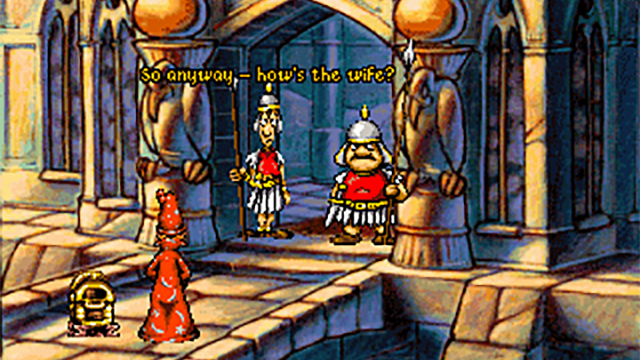
At a time when classic PC games are more accessible than ever, the Discworld trilogy of adventure games has remained frustratingly elusive. Based on Terry Pratchett's long-running comic fantasy series, the three adventure games—Discworld, Discworld 2, and Discworld Noir, were developed by Perfect Entertainment and released between 1995 and 1999. Perfect shut down shortly after Noir launched, and ever since the trilogy has been abandonware.
But hope lies on the horizon. In a recent interview with Time Extension, Perfect's cofounder Gregg Barnett revealed that a rerelease is being pursued. "I don't want to give you a scoop, but a Discworld rerelease may happen," Barnett said when asked if any companies had approached him about the subject. "It's on the cards. It may happen. And then it could advance to new versions of them."
The reason Barnett says "may" rather than "will" comes down to complications regarding who owns the rights to the games in the UK. "It turns out that 50% reverted to me as the creator because the company Perfect Entertainment has been closed for 10 years," he said.
The other half of the rights, meanwhile, belong to... King Charles?
"Whenever something closes in the UK, intellectual property rights revert 50% to the original creator and 50% to the Crown, which is King Charles," Barnett said. "So yes, there have been discussions and something may be happening down the track—a rerelease or a remaster. But it's obviously a complicated process when you're dealing with the Crown."
Barnett is apparently referring to UK law around "bona vacantia," or vacant goods, which would apply to intellectual property if it was wasn't transferred to another owner before a company was dissolved. In those cases, the government does indeed take control of the rights, though there's seemingly no mention of the rights being split with the original creator on the UK's bona vacantia website.
The Crown's potential role in this tangled situation was apparently a surprise to game designer Rhianna Pratchett. PC Gamer contacted the Terry Pratchett estate to clarify its perspective on the current rights situation surrounding both the existing Discworld games and any future Discworld video game projects. Regarding the existing trilogy of games, Rhianna Pratchett, who's joint owner of production company Narrativia which controls the multimedia rights to his works, responded:
Keep up to date with the most important stories and the best deals, as picked by the PC Gamer team.
"We only have rights to the characters, not the games themselves. If we did have the rights, then this would be a whole lot easier. We’re genuinely not sure who does own the rights because studios have been bought and sold over the years, along with IP. Last time we investigated this, they were thought to be with Sony, but that’s never been fully confirmed. We’d certainly love to see the old games rereleased. It’s news to us if His Majesty owns 50% of the Discworld games. Who knows what might happen if that’s really the case. Maybe he’s a fan!"
In the same interview with Time Extension, Barnett also says that he'd like to make new Discworld games, but again, the rights are complicated. "Unfortunately, before Terry passed away, him or his agent or somebody had signed off every property to either ITV or Prime or the BBC literally across the board."
That's not quite right, though, according to Rhianna Pratchett. "No one has signed off everything to anybody," she told PC Gamer. "We still own the IP rights... The reason why Gregg got the rights to do the games was that he came with solid ideas which fitted the nature of Discworld. The simple reason that there’s never been a fully fledged Discworld game since then is no one has come to us with the right ideas and the resources to actually make it happen."
So maybe the rights situation isn't quite as bad as Barnett thought—but it most definitely is complicated. You can read the full interview with Barnett here.
Rick has been fascinated by PC gaming since he was seven years old, when he used to sneak into his dad's home office for covert sessions of Doom. He grew up on a diet of similarly unsuitable games, with favourites including Quake, Thief, Half-Life and Deus Ex. Between 2013 and 2022, Rick was games editor of Custom PC magazine and associated website bit-tech.net. But he's always kept one foot in freelance games journalism, writing for publications like Edge, Eurogamer, the Guardian and, naturally, PC Gamer. While he'll play anything that can be controlled with a keyboard and mouse, he has a particular passion for first-person shooters and immersive sims.

